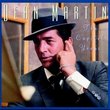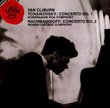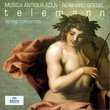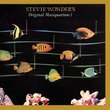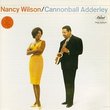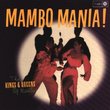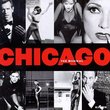| All Artists: Antonin Dvorak, Camille Saint-Saens, Carlo Maria Giulini, London Philharmonic Orchestra Title: Dvorak & Saint-Saens: Cello Concertos Members Wishing: 1 Total Copies: 0 Label: EMI Classics Original Release Date: 1/1/1977 Re-Release Date: 9/11/2001 Album Type: Original recording remastered Genre: Classical Styles: Forms & Genres, Concertos, Instruments, Strings, Symphonies Number of Discs: 1 SwapaCD Credits: 1 UPCs: 724356759428, 724356759459 |
Search - Antonin Dvorak, Camille Saint-Saens, Carlo Maria Giulini :: Dvorak & Saint-Saens: Cello Concertos
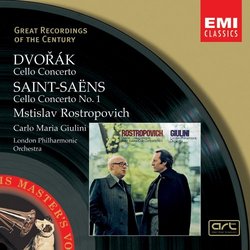 | Antonin Dvorak, Camille Saint-Saens, Carlo Maria Giulini Dvorak & Saint-Saens: Cello Concertos Genre: Classical
|
Larger Image |
CD DetailsSimilarly Requested CDs
|
CD ReviewsUnbelievable Performance L. Ku | New York | 07/11/2004 (5 out of 5 stars) "Dvorak's Cello Concerto is one of the most deeply monumental, moving works ever written. Giulini's stirring leadership really reaches deep into the score and brings out its powerful meaning. Also, Rostropovich, the 'master cellist', of course gives you nothing less of a magnificent performance.Again, I can not express how towering a piece of work the Dvorak is, and how successfully Giulini's London Philharmonic is in performing it. The charming lyrical melodies loom over the tremendously powerful opening movement. The second movement is deeply felt, with its sudden outburst of emotion 3+ minutes in, immediately followed by a romantic melody giving tribute to Dvorak's much loved sister-in-law in ailing health. The 3rd movement, also very moving, uses a triangle and solo violin to create even more emotional effects, with more nostalgic moments for the sister-in-law, who has now died.The Saint-Saens is a personal favorite of Slava. A fine masterpiece to create a great coupling with the Dvorak.This disc is a moment of musical history. Highly reccomended. Of course, you should also eventually own Slava's other recordings as well, and don't forget to look into Jacqueline de Pre either." A too-often overlooked gem gcappelli | Oxford, England | 12/01/2003 (5 out of 5 stars) "Long overshadowed by the much more famous 1969 Karajan/ Rostropovich recording on DG, this recording is undergoing a bit of a rediscovery (probably because of its recent release on the "Greatest Recordings of the Century" label). But no matter what the reason, its growing acclaim is well deserved. Some have commented that the first movement of the Dvorak is marginally slower than the Karajan recording, and this reduces its dramatic impact. But while this is perhaps true, this approach instead highlights its lyrical qualities. Giulini is much more successful than Karajan in bringing out Dvorak's folk music influence. Giulini is best known as an opera conductor, and I'm sure his experience with singing allowed him to better express the concerto's lyricism. The result is a very moving interpretation, one which I think has a much better blend of drama and lyricism than does Karajan's recording.Secondly, Rostropovich's playing is impeccable. In fact, I think I like him better here than in the Karajan recording. His tone and pitch are suburb, like they are in nearly all his recordings. But the extra space Giulini gives him by slowing down the tempi allows Rostropovich to explore the music a bit more, adding his own unique interpretations to the concertos, often with riveting results. The middle of the third movement of the Dvorak is a case in point. Rostropovich's playing is simply so musical, so fantastically beautiful that one cannot but marvel.In short, this recording deserves every ounce of praise now being bestowed upon it. It is a great buy for anyone who likes Dvorak, Giulini, Rostropovich or cello music in general. I would strongly recommend that you buy both this recording and Karajan's, so that you can hear two very different interpretations, and see how each emphasizes a different aspect of the music. Both are wonderful, and the subordinate position this recording has endured is unjustifiable." Underrated Great Performance of the Dvorak Cello Concerto John Kwok | New York, NY USA | 11/29/2002 (5 out of 5 stars) ""Slava" Rostropovich has recorded the Dvorak Cello Concerto at least four times; his most memorable recordings are those with Karajan and the Berlin Philharmonic on Deutsche Grammophon and Ozawa and the Boston Symphony on Erato. However, this recent EMI reissue may be his best performance yet, since it is blessed with an unusually passionate, lyrical performance by the London Philharmonic under Carlo Maria Giulini's baton. Giulini is far more successful than either Karajan or Ozawa in probing the lyricism present in Dvorak's score. Both he and the London Philharmonic are splendid accompanists too with Rostropovich in a dazzling version of Saint-Saens 1st Cello Concerto. If you own either the Karajan or Ozawa versions, you should definitely acquire this fine performance too."
|

 Track Listings (6) - Disc #1
Track Listings (6) - Disc #1